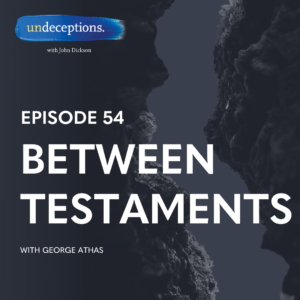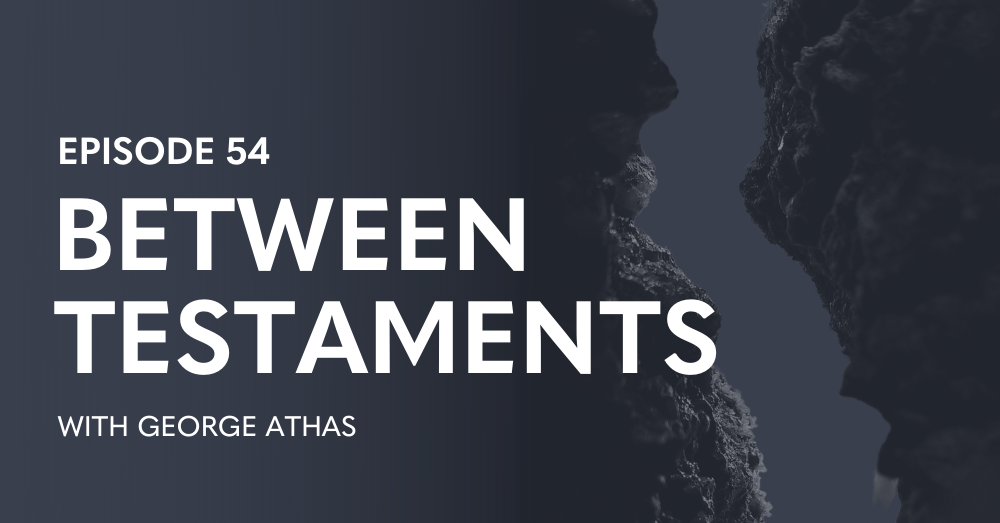
The period between the Old and New Testaments – often called the ‘intertestamental period’ – has also been called a period of silence. Turn the page from Old to New and – whoosh! – you skip over almost 500 years, including huge historical figures like Alexander the Great!
But plenty of important stuff happened in this period that set the world up for Jesus. So why is the Bible silent about it? Is it silent about it?
This episode is sponsored by Zondervan’s new book Why is there suffering? by Bethany Sollereder.
COMPETITION!
Go to Apple Podcasts, write a review of Undeceptions, send us a screenshot of what you wrote, and we have a free hardcover copy of John Dickson’s new book Bullies and Saints for the 5 best-written reviews. Extra points for using the Oxford comma! Details in the shownotes for this episode.
To WIN, all you have to do is leave us a review on Apple Podcasts (what used to be called iTunes), take a pic of the review and send it to us. Producer Kaley will pick the 5 best-written reviews in the next few weeks.
Meet our guest

The Rev Dr George Athas is Director of Research at Moore Theological College, and author of several books and articles, including Ecclesiastes, Song of Songs (The Story Of God Bible Commentary Series and Deuteronomy: One Nation Under God. His research interests include the Old Testament prophetic books; Ecclesiastes; Song of Songs; apocalyptic literature; the exilic and post-exilic periods; Second Temple Judaism and early Christianity; history and archaeology of the ancient Near East and Mediterranean; biblical theology; and Hebrew language.
Click to buy Dr Athas’ new book, Bridging The Testaments, which comes out in October 2023.* (Affiliate link)
Featured Music

Michael Levy is a composer for the lyre. His music is a blend of some original ancient melodies and some of his own creations. His arrangements for solo lyre are based on reconstructions of some of the incredibly rare, actual surviving written music of antiquity. We played two of these reconstructions in our episode, with permission: Ma Tovu and Kandel’s Hora. You can find out more about Michael’s work, and listen to more of his music at ancientlyre.com.

Yamma Ensemble is an Israeli world music group who have a beautiful love of the Hebrew language and ancient instruments. We played parts of their live recordings of Psalm 104 (see below) and also a track featuring the ancient Shofar, based on the Mi’mekomcha, a Jewish prayer. All music used with permission.
Links
Download the transcript for this episode here.
- Here’s a basic timeline of Jerusalem that might be helpful to get your bearings.
- Watch Alexander, the 2004 biopic we reference at the top of the ep. Though, to be honest, it really wasn’t very good.
- Get the Oxford Classical Dictionary here.
- This YouTube discovery made Producer Kaley’s day:
- Read a little more about George Athas’s upcoming book Bridging The Testaments (Zondervan Academic) in this article he wrote for Eternity News.
- Read George’s PhD thesis, The Tel Dan Inscription (Sheffield Academic Press) which focused on the amazing 1993 discovery in Galilee of an inscription mentioning the dynasty of king David (of David and Goliath fame) – it’s likely the first mention of David outside the Bible.
- Here’s an interesting New York Times article about Jewish communities in Myanmar and India who claim to be descendants of the lost tribes of Israel.
- Find out more about the archaeological evidence we have for the destruction of the Jerusalem Temple (‘the first temple’) by the Babylonians in 586 BC.
- Take a look at the Cyrus Cylinder, housed in the British Museum, which features an inscription mentioning how wonderful the Persian King Cyrus is, of course, but also that he allowed certain subjugated peoples – like the Jews – to return to their homelands and restore their own temples.
- So, what’s The Talmud? Here’s an introduction.
- The Jewish Virtual Library has a heap of maps from this period, so you can see stretch of the Assyrian Empire, the Babylonian Empire, the Persian Empire, the Hellenistic World and the Herodian Kingdom.
- You might like to check out the 1998 documentary In The Footsteps of Alexander to get a good overview of Alexander The Great.
- Get to know more about Ben Sira.
- Read more from Josephus on The Jewish War and Antiochus IV Ephiphanes persecution of the Jewish people.
- Meet the High Priest Simon (also called ‘Simon the Just’)
- Then, meet Antipater, the Roman-friendly governor of Judaea and founder of the Herodian Dynasty (father of Herod The Great)
- And then, of course, there’s Herod I The Great, who was later made King of Judaea by the Romans.
- Take a look at Herod’s Temple, the ‘Second Temple’.
- And also, this article about the engineering feat of the temple and those massive foundation stones.
- Josephus records: Herod announced, “I know the Jews will greet my death with wild rejoicings; but I can be mourned on other people’s account and make sure of a magnificent funeral if you will do as I tell you. These men under guard — as soon as I die, kill them all….” Salome disobeyed, and released the prisoners when Herod died, Josephus added.
- Herod died a very painful death, and his symptoms were recorded in detail. Read this article for more gross details after Jan Hirschmann, professor of medicine at the University of Washington, in Seattle, analysed his symptoms and gave her own diagnosis in 2002 (article from The New Scientist)
- Who wrote Ecclesiastes? Read this analysis from Zondervan Academic and John Walton.
- This is a really indepth article on the challenges in dating the Book of Daniel, from The Gospel Coalition.
- Here’s the verse in the Book of Jude that references the apocryphal text 1 Enoch.
- Here’s what John Dickson said about that reference in the episode: “This isn’t necessarily because Jude thought 1 Enoch was Old Testament Scripture – it wasn’t! – but he did think it made an excellent theological point – about the coming judgment of God – and so it was worth citing with approval. “
- Here are some readings from the so-called ‘intertestamental texts’:
From the Book of 1 Maccabees:
From the Book of 1 Enoch:
From Ben Sira
From the Dead Sea Scrolls, the so called Messianic Apocalypse which was discovered in Cave 4 at Qumran (scrolls were scattered across eleven caves at the site). Though fragmentary, the passage powerfully expresses the Jewish hope for a Messiah, an eternal kingdom and the healings and good news promised centuries earlier by the prophet Isaiah:
- OK… now, who are the Essenes?
- The Sadducees?
- The Pharisees?
- The Zealots?
- Read again Luke 4:16 – 21:
16 And he came to Nazareth, where he had been brought up. And as was his custom, he went to the synagogue on the Sabbath day, and he stood up to read. 17 And the scroll of the prophet Isaiah was given to him. He unrolled the scroll and found the place where it was written,
18 “The Spirit of the Lord is upon me,
because he has anointed me
to proclaim good news to the poor.
He has sent me to proclaim liberty to the captives
and recovering of sight to the blind,
to set at liberty those who are oppressed,
19 to proclaim the year of the Lord’s favor.”20 And he rolled up the scroll and gave it back to the attendant and sat down. And the eyes of all in the synagogue were fixed on him. 21 And he began to say to them, “Today this Scripture has been fulfilled in your hearing.”
* This is an affiliate link. Purchases made through this link provide a % of the sale back to Undeceptions.
Want to send John Dickson a question? He loves them. Just click here to provide a query for our next Q and A show!
Undeceptions is part of the Undeceptions Network. Seeking to ‘undeceive ourselves’, and let the truth ‘out’.












































